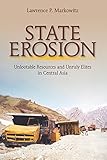State erosion [electronic resource] : unlootable resources and unruly elites in Central Asia / Lawrence P. Markowitz.
Material type: TextPublication details: Ithaca : Cornell University Press, 2013. 2015)Description: 1 online resource (pages cm)ISBN:
TextPublication details: Ithaca : Cornell University Press, 2013. 2015)Description: 1 online resource (pages cm)ISBN: - 9780801469466
- 0801469465
- Uzbekistan -- Politics and government -- 1991-
- Tajikistan -- Politics and government -- 1991-
- Elite (Social sciences) -- Political activity -- Uzbekistan
- Elite (Social sciences) -- Political activity -- Tajikistan
- Natural resources -- Political aspects -- Uzbekistan
- Natural resources -- Political aspects -- Tajikistan
- Failed states -- Tajikistan
- 958/.042 23
- DK928.8657 .M37 2012
Includes bibliographical references and index.
Rethinking the resource curse -- Rents and resources under soviet rule -- Pathways to failure : Tajikistan and Uzbekistan -- Tajikistan's fractious state -- Coercion and rent-seeking in Uzbekistan -- Weak and failed states in comparative perspective.
"State failure is a central challenge to international peace and security in the post-Cold War era. Yet theorizing on the causes of state failure remains surprisingly limited. In State Erosion, Lawrence P. Markowitz draws on his extensive fieldwork in two Central Asian republics--Tajikistan, where state institutions fragmented into a five-year civil war from 1992 through 1997, and Uzbekistan, which constructed one of the largest state security apparatuses in post-Soviet Eurasia--to advance a theory of state failure focused on unlootable resources, rent seeking, and unruly elites. In Tajikistan, Uzbekistan, and other countries with low capital mobility--where resources cannot be extracted, concealed, or transported to market without state intervention--local elites may control resources, but they depend on patrons to convert their resources into rents. Markowitz argues that different rent-seeking opportunities either promote the cooptation of local elites to the regime or incite competition over rents, which in turn lead to either cohesion or fragmentation. Markowitz distinguishes between weak states and failed states, challenges the assumption that state failure in a country begins at the center and radiates outward, and expands the "resource curse" argument to include cash crop economies, where mechanisms of state failure differ from those involved in fossil fuels and minerals"-- Publisher's Web site.
Description based on print version record.


There are no comments on this title.